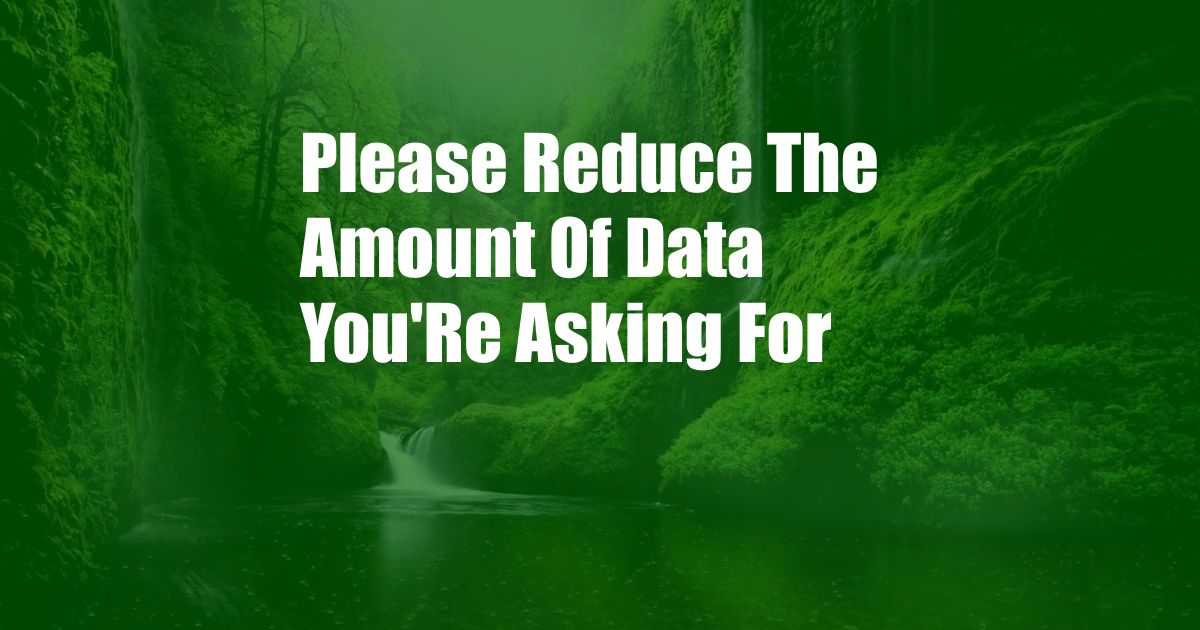
Please Reduce the Amount of Data You’re Asking For
In today’s digital age, we are constantly bombarded with requests for our personal data. From social media platforms to e-commerce websites, it seems like every company wants to know our name, email address, phone number, and more. While it’s important for businesses to collect some data in order to provide us with the best possible experience, there is a growing concern that they are asking for too much information.
I recently had an experience that made me think about this issue. I was signing up for a new streaming service and was asked to provide my name, email address, phone number, credit card number, and even my social security number. I was shocked by how much information they were requesting. I understand that they need my credit card number to process my payment, but I don’t see why they need my social security number. I decided not to sign up for the service.
Why Companies Are Asking for More Data
There are a number of reasons why companies are asking for more data. First, they want to use this data to improve their products and services. By collecting data on our preferences, they can tailor their offerings to our specific needs. For example, if a streaming service knows that you like to watch action movies, they can recommend more action movies to you.
Second, companies want to use data to target us with advertising. By collecting data on our demographics, interests, and online behavior, they can create more targeted ads that are more likely to be relevant to us. For example, if a company knows that you are a middle-aged woman who lives in a suburban area, they might target you with ads for products and services that are relevant to your interests, such as home improvement products or parenting advice.
The Risks of Sharing Too Much Data
While there are some benefits to sharing your data with companies, there are also some risks. One of the biggest risks is that your data could be hacked or stolen. If this happens, your personal information could be used for identity theft, fraud, or other criminal activity.
Another risk is that your data could be used to discriminate against you. For example, if an insurance company knows that you have a certain health condition, they might charge you higher rates for health insurance. Or, if an employer knows that you have a certain political affiliation, they might not hire you.
What You Can Do to Protect Your Privacy
There are a number of things you can do to protect your privacy online. First, be mindful about the information you share. Only share information that you are comfortable with sharing, and be aware of the risks involved. Second, use strong passwords and security measures to protect your accounts. Third, be careful about clicking on links or opening attachments from unknown senders. Fourth, read the privacy policies of websites and apps before you provide them with your information.
Tips for Reducing the Amount of Data You Share
Here are a few tips for reducing the amount of data you share with companies:
- Use privacy-focused search engines, such as DuckDuckGo or StartPage.
- Use ad blockers to block ads that track your online activity.
- Use privacy-focused browsers, such as Firefox or Brave.
- Disable location tracking on your devices.
- Use strong passwords and security measures to protect your accounts.
- Be mindful about the information you share online.
Conclusion
It’s important to be aware of the risks of sharing your personal data online. By taking steps to protect your privacy, you can reduce the likelihood of your data being hacked or stolen. You can also reduce the amount of data that companies collect on you by using privacy-focused tools and services.
Are you concerned about the amount of data that companies are asking for? Let me know in the comments below.
FAQ
- **What are the risks of sharing too much data?**
- **What can I do to protect my privacy online?**
- **How can I reduce the amount of data that I share with companies?**
The risks of sharing too much data include identity theft, fraud, discrimination, and other criminal activity.
There are a number of things you can do to protect your privacy online, such as using privacy-focused search engines, ad blockers, and browsers, disabling location tracking, using strong passwords and security measures, and being mindful about the information you share online.
You can reduce the amount of data that you share with companies by using privacy-focused tools and services, such as privacy-focused search engines, ad blockers, and browsers, and by being mindful about the information you share online.